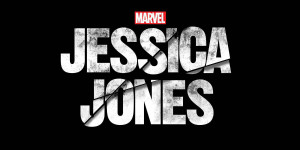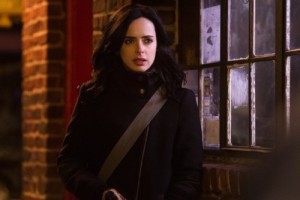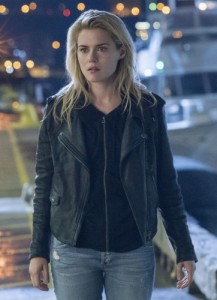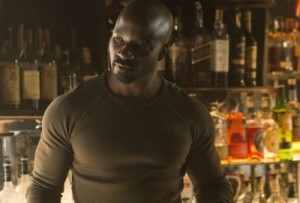 SUMMARY: An assured premiere that traffics in emotional trauma to give the series its unique identity.
SUMMARY: An assured premiere that traffics in emotional trauma to give the series its unique identity.
If you have not seen this episode yet and do not wish to be spoiled, do not continue reading!
Recap
Failed former superhero turned private investigator Jessica Jones takes a job from frequent employer Jeryn Hogarth, an attorney, to serve a summons on a lawsuit to a scummy strip club owner named Gregory Spheeris. After finding out where Spheeris will be the next night, and haunted by her dreams, Jessica follows up on a different unsolved case involving a bartender named Luke Cage. While watching Cage have yet another of many meaningless sexual encounters, she is plagued by visions of creepy man. She drinks herself unconscious.
The next day, Jessica is hired by the parents of Hope Shlottman to find their daughter who has curiously gone missing. Jessica tracks down the apartment Hope shared with a friend and finds a credit card statement. Later, she stops Spheeris away from his bodyguards, scaring him with her abilities, and serving him the summons. Jessica checks in on her payment with Hogarth, who is tied up with a young female intern for the evening. Jessica goes to check out Cage’s bar again and runs into him. They chat as she gets pretty drunk and the two end up in bed together, something both are shaken by. She finds a picture of a woman in his bathroom medicine cabinet, adding to the mystery she’s trying to solve.
Jessica follows a series of odd credit card purchases by Hope, eventually ending up at a Japanese restaurant in a location that is disturbingly familiar to her. The maitre’d tells her about Hope being there with a man who somehow got the restaurant to do everything he wanted. She instantly recalls the creepy man who held her captive and led her through the same rituals. She finds out that the Shlottmans were referred to her by a man at the police station who overheard them asking the cops for help finding their daughter. Distraught, Jessica desperately tries to find money to escape town, eventually having to turn to former friend Trish Walker, a successful radio talkshow host. Trish doesn’t believe Jessica about the creepy man being back at first, as he was declared dead a year previous, but insists Jessica needs to help Hope if he’s got her under his influence.
Jessica can’t initially bring herself to help, but on her way to the airport she decides she can’t leave Hope alone. She goes to the hotel where she was involuntarily held by the creepy man, Kilgrave. Pulling a fire alarm to get everyone out of the building, she cautiously enters the familiar hotel room and eventually finds Hope, heavily under Kilgrave’s influence. Hope fights with everything to stay as Jessica drags her out of the room and back to her place. She convinces Hope that anything she’s done isn’t her fault and that she needs to leave town. Hope’s parents arrive to take her back to Omaha, but as the leave by elevator, Hope pulls a gun from her purse and kills her parents. Jessica is shaken to her core and wants to get away, but decides she’s the only one who can make a stand against Kilgrave.
For a full recap of this episode, quotes, and trivia, visit our handy episode guide.
Review
One of the things that was most appealing about the deal announced between Marvel and Netflix a couple of years ago to bring a collection of street level superhero series to the streaming service was that it could provide a corner of the associated Marvel Cinematic Universe that we wouldn’t get to see on the big-screen. Something not only smaller scale and intimate but darker and more intense.
The characters announced for the four series that would eventually tie into the group mash-up mini-series The Defenders hinted at two specific comic lines from the source material, Marvel Knights and Marvel MAX. Knights was a stable of books that learned heavier into dark recesses of street crime and the occult, while MAX was a mature imprint that allowed exploration through sex, violence, and human depravity. All were things far different than anything we’d seen in the decidedly more general audience friendly MCU films. Even network series Agents of S.H.I.E.L.D. and Agent Carter hewed much closer to the feel of the big-screen adventures. It was clear that these series centered around Hell’s Kitchen in New York City were going to reference the MCU but be fairly well standalone. We just weren’t entirely sure how they were going to play.
Daredevil premiered back in April to both critical fanfare and deep praise by the audience. It was a slow, methodical march through the crime and corruption of a city and one blind lawyer’s attempt to put things right. It was moody and violent, but not gratuitous. There was weight and consequence to everything, and it instantly became one of the best parts of the whole Marvel live-action endeavor. What we got was less a traditional TV series and more a 13-part movie that allowed us to really delve into not only the psyche of the hero at the center — as well as the pathos of the villain — but of this ragged part of the city and its people as well.
The series was a triumph, but aside from setting a high bar for the other series to follow, it made one wonder what the other series could offer that would be different and complement such an exceptional start to this little pocket world of the MCU. We had some ideas based on what we knew of the source material for each of Jessica Jones, Luke Cage, and Iron Fist, but would they play as well or be as poignant as Matt Murdock’s outing.
The first hour of Jessica Jones quickly identifies itself of a piece with Daredevil and yet something else entirely. The comics were about a hero who had failed but found her calling in being a PI and investigating a lot of strange occurrences around the superhero community. There is a specific story of why Jessica failed, and it serves as the basis for the first season of the series.
The premiere skirts at the specifics of Jessica’s ordeal with Kilgrave, lightly alluding to his enhanced ability to control people’s minds without outright stating it. Instead, the hour eases us into Jessica’s past horror by presenting a case of a missing young woman who Jessica slowly comes to find is under Kilgrave’s influence. It’s an extraordinarily shrewd approach because it allows us to experience Jessica’s pure terror not only over her past, which still haunts her, but as she realizes that this monster is still alive and still coming after her.
Rather than just telling another hero’s tale set on the same turf as Daredevil, Jessica Jones is primarily about the emotional cost of an ongoing personal violation. What they hold back on the details of Kilgrave’s capture of Jessica and just how long she was under his influence is more than made up with the visceral feeling of danger once Hope’s dilemma comes into focus. Jessica drinks heavily as a means of escape from the memories and from what appear to be vestiges of the mental hold Kilgrave had on her. She buries herself in the unsavory work common to most P.I.s. We know right from the get-go that she is broken, scarred, and simply muddling her way through survival. But it’s the moment at the Japanese restaurant, before she even enters and gets the story from the maitre’d that confirms her worst fears, when she recognizes the location and lets out this odd “Oh no” that defines just how foundational this hurt and her pain its caused are not just to her but to the series.
It’s the kind of dark and intimate we never could’ve imagined would really come from this Marvel-Netflix experiment. And it is astoundingly good.
Anchoring the entire thing in one of the most engaging performances you’ll see on TV this year is Krysten Ritter as Jessica. She’s turned in entertaining work over the years in various projects like Veronica Mars and Don’t Trust the B—- in Apartment 23. But not even her stellar work on Breaking Bad and even a convincing badass guest turn in the second season premiere of The Blacklist could prepare for how thoroughly lived in and authentic she is as Jessica. The noirish voiceover narration is a bit irksome in that fashion that most narration tends to be, but there otherwise isn’t a single seam in her performance. She’s compelling to watch throughout, but more than that, she has a way of connecting the viewer with Jessica’s vulnerability almost immediately. It’s not forced nor is it an oversell, and that connection really helps to push the emotional impact of both Jessica’s and Hope’s torments. I wasn’t thoroughly sold on Ritter’s casting when it was announced, but she inhabits Jessica Jones through and through.
What’s yet another treat of this Marvel-Netflix alliance is that Ritter is surrounded by an exceptional supporting cast that feels just as lived in. In just a few strokes, they are able to present Jessica’s regular employer Jeryn Hogarth as a complicated woman. She’s a married lesbian having an affair (or perhaps one of many) with a young intern at her law firm, and she hires Jessica even though the firm just took on a full-time investigator and Jessica’s methods have garnered their fair share of complaints. There aren’t too many scenes of Hogarth in this opening chapter but the plots already kicked off and Carrie-Anne Moss’ grounded performance immediately provide her relevance.
The same can be said of Rachael Taylor’s Trish Walker. As a public personality, the show has the opportunity to introduce Trish by way of a series of marketing images that loom over Jessica at various points throughout the city. It’s only when Jessica desperately needs money that we are formally introduced to Trish and the complexity of their connection. Trish is fully aware of what Jessica went through with Kilgrave and tried her best to be there for her friend before Jessica abruptly cut off contact six months ago. Apparently, she was the one who encouraged Jessica to pursue her abilities as a hero that eventually got her into Kilgrave’s crosshairs. The majority of this is touched on in a brief conversation between the two, but there is a gulf of words and experience shared between Taylor and Ritter without so much as a peep. This is an important relationship for Jessica and the show and the chemistry had to be right. It is dead-on with these two and you feel instantly that they’ve known each other a lifetime.
And then there’s Mike Colter’s Luke Cage, who is actually never named throughout this first episode. Jessica alludes to her watching of Cage as being part of some unsolved case, and that is further compounded by her emotional reaction to the picture of the woman she finds in Luke’s bathroom. These are two people who don’t want to have deep connections because of their respective hurts, and one can easily see the connection to his melancholy Jessica feels just watching him stare out the window. Just as with Taylor, there is an easy chemistry between Ritter and Colter that makes it believable each would find the other attractive and embark on their, for the time being, one-night stand. The charged conversation between the two in the bar is one of the more engaging between a couple seen in a while, and both manage to imbue what could easily have been an uncomfortable sex scene with both gravitas and pathos that give it far more than an exploitative feel. These are lost souls connecting and you can see in both that it offers its own share of terror. Beyond that, Colter feels just as well-established in Cage’s impervious skin as Ritter does in Jessica, and with his natural charisma to boot, this is a terrific piece of casting that bodes well for Luke Cage’s own upcoming series.
What the series trades in is broken people. While most series premieres have to concern themselves with world-building as much as character introduction, Jessica Jones assuredly eschews all of that to instead focus on emotional building. It is more concerned with who these people are as emotional creatures and the ways in which their lives have impacted them on that level, and it tosses the audience right in without water wings. The show never feels out of sync with the world Daredevil established, and yet it feels wholly its own with a very specific point of view in telling its story. Everything is in service of that, from the cinematography right on down to the set design, which never feels less than real.
Judging by its first hour, the show is a triumph. As exceptional as the first season of Daredevil is, this opening salvo holds promise that Jessica Jones trumps it. And the scary thing is we really haven’t even gotten to know David Tennant’s villain firsthand yet. That’s a good sign.







